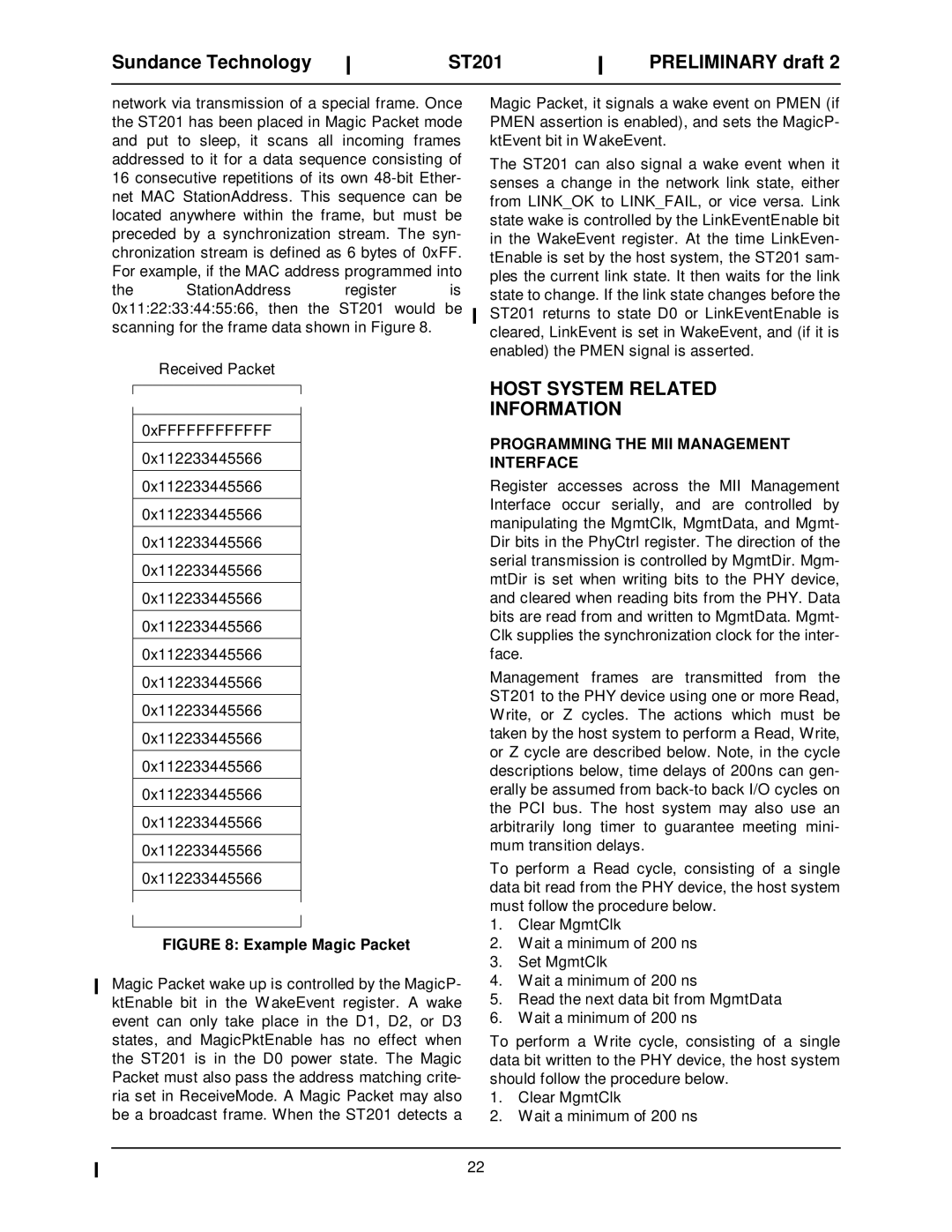
Sundance Technology
ST201
PRELIMINARY draft 2
network via transmission of a special frame. Once the ST201 has been placed in Magic Packet mode and put to sleep, it scans all incoming frames addressed to it for a data sequence consisting of
16consecutive repetitions of its own
the StationAddress register is 0x11:22:33:44:55:66, then the ST201 would be scanning for the frame data shown in Figure 8.
Received Packet
0xFFFFFFFFFFFF
0x112233445566
0x112233445566
0x112233445566
0x112233445566
0x112233445566
0x112233445566
0x112233445566
0x112233445566
0x112233445566
0x112233445566
0x112233445566
0x112233445566
0x112233445566
0x112233445566
0x112233445566
0x112233445566
FIGURE 8: Example Magic Packet
Magic Packet wake up is controlled by the MagicP- ktEnable bit in the WakeEvent register. A wake event can only take place in the D1, D2, or D3 states, and MagicPktEnable has no effect when the ST201 is in the D0 power state. The Magic Packet must also pass the address matching crite- ria set in ReceiveMode. A Magic Packet may also be a broadcast frame. When the ST201 detects a
Magic Packet, it signals a wake event on PMEN (if PMEN assertion is enabled), and sets the MagicP- ktEvent bit in WakeEvent.
The ST201 can also signal a wake event when it senses a change in the network link state, either from LINK_OK to LINK_FAIL, or vice versa. Link state wake is controlled by the LinkEventEnable bit in the WakeEvent register. At the time LinkEven- tEnable is set by the host system, the ST201 sam- ples the current link state. It then waits for the link state to change. If the link state changes before the ST201 returns to state D0 or LinkEventEnable is cleared, LinkEvent is set in WakeEvent, and (if it is enabled) the PMEN signal is asserted.
HOST SYSTEM RELATED
INFORMATION
PROGRAMMING THE MII MANAGEMENT INTERFACE
Register accesses across the MII Management Interface occur serially, and are controlled by manipulating the MgmtClk, MgmtData, and Mgmt- Dir bits in the PhyCtrl register. The direction of the serial transmission is controlled by MgmtDir. Mgm- mtDir is set when writing bits to the PHY device, and cleared when reading bits from the PHY. Data bits are read from and written to MgmtData. Mgmt- Clk supplies the synchronization clock for the inter- face.
Management frames are transmitted from the ST201 to the PHY device using one or more Read, Write, or Z cycles. The actions which must be taken by the host system to perform a Read, Write, or Z cycle are described below. Note, in the cycle descriptions below, time delays of 200ns can gen- erally be assumed from
To perform a Read cycle, consisting of a single data bit read from the PHY device, the host system must follow the procedure below.
1.Clear MgmtClk
2.Wait a minimum of 200 ns
3.Set MgmtClk
4.Wait a minimum of 200 ns
5.Read the next data bit from MgmtData
6.Wait a minimum of 200 ns
To perform a Write cycle, consisting of a single data bit written to the PHY device, the host system should follow the procedure below.
1.Clear MgmtClk
2.Wait a minimum of 200 ns
22
